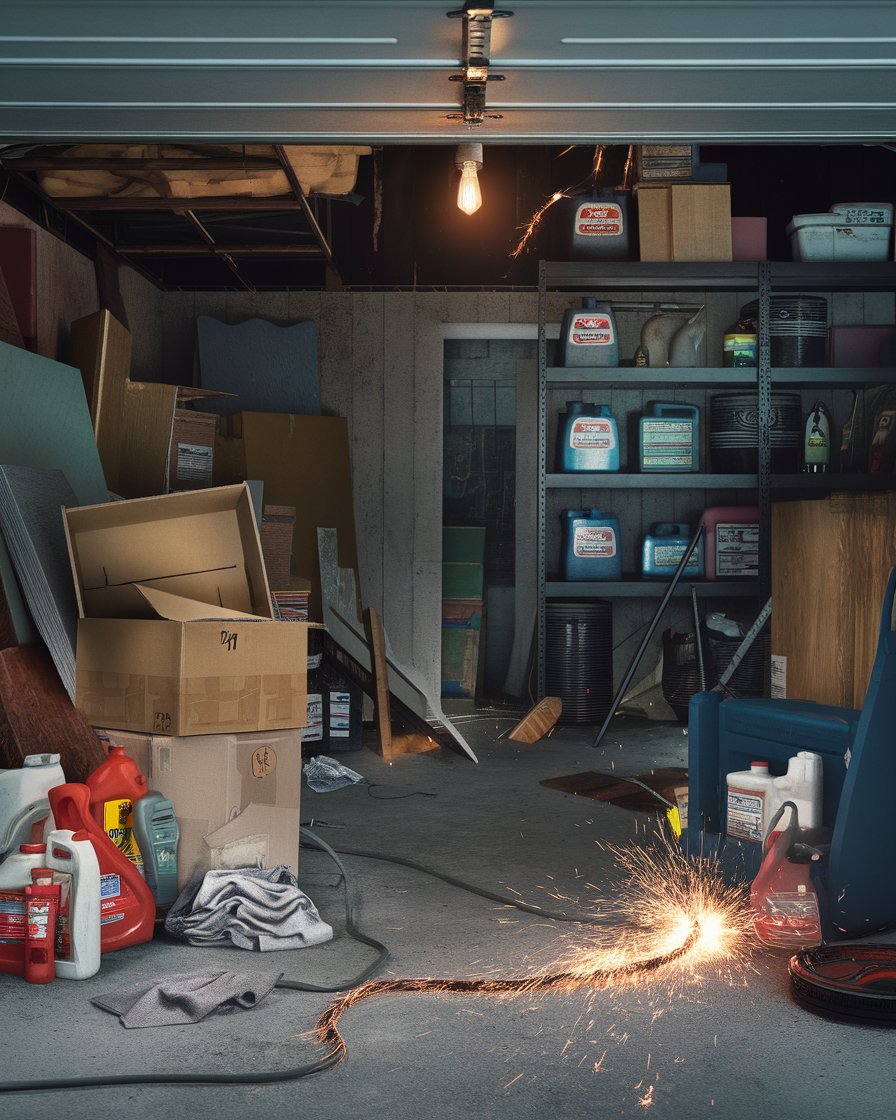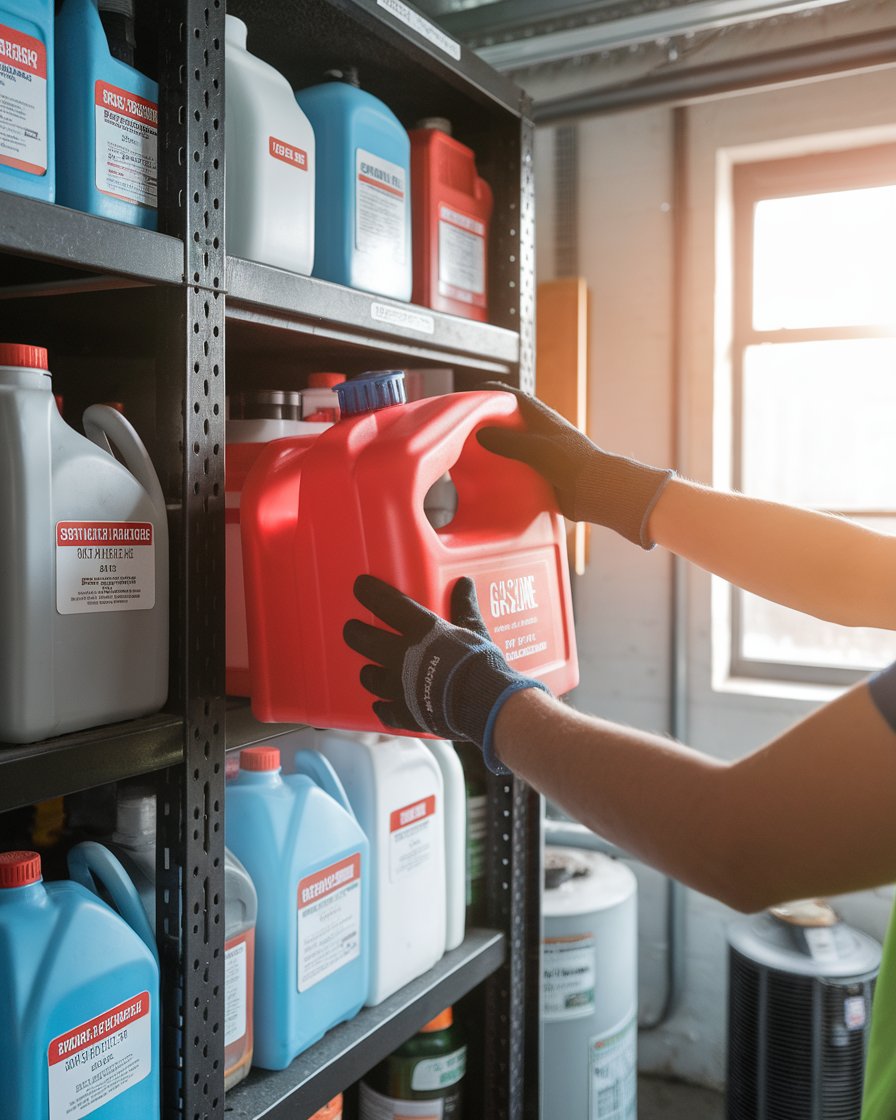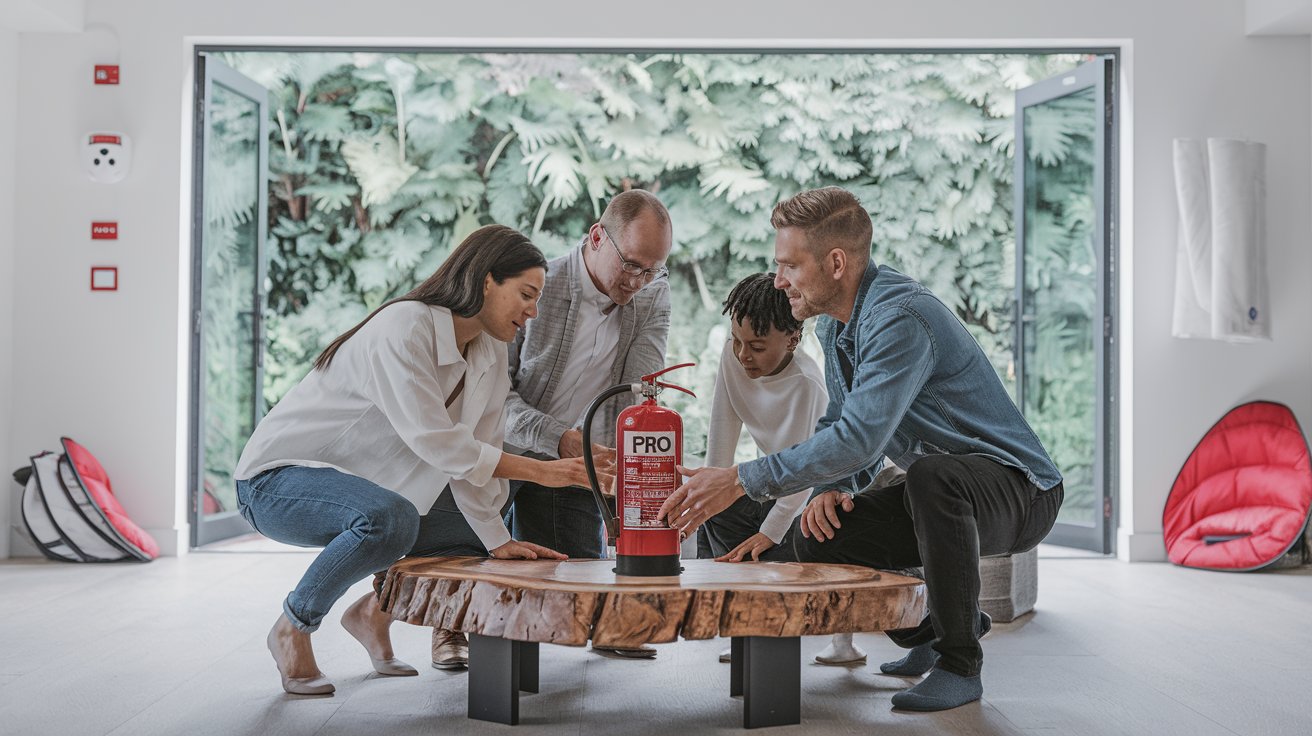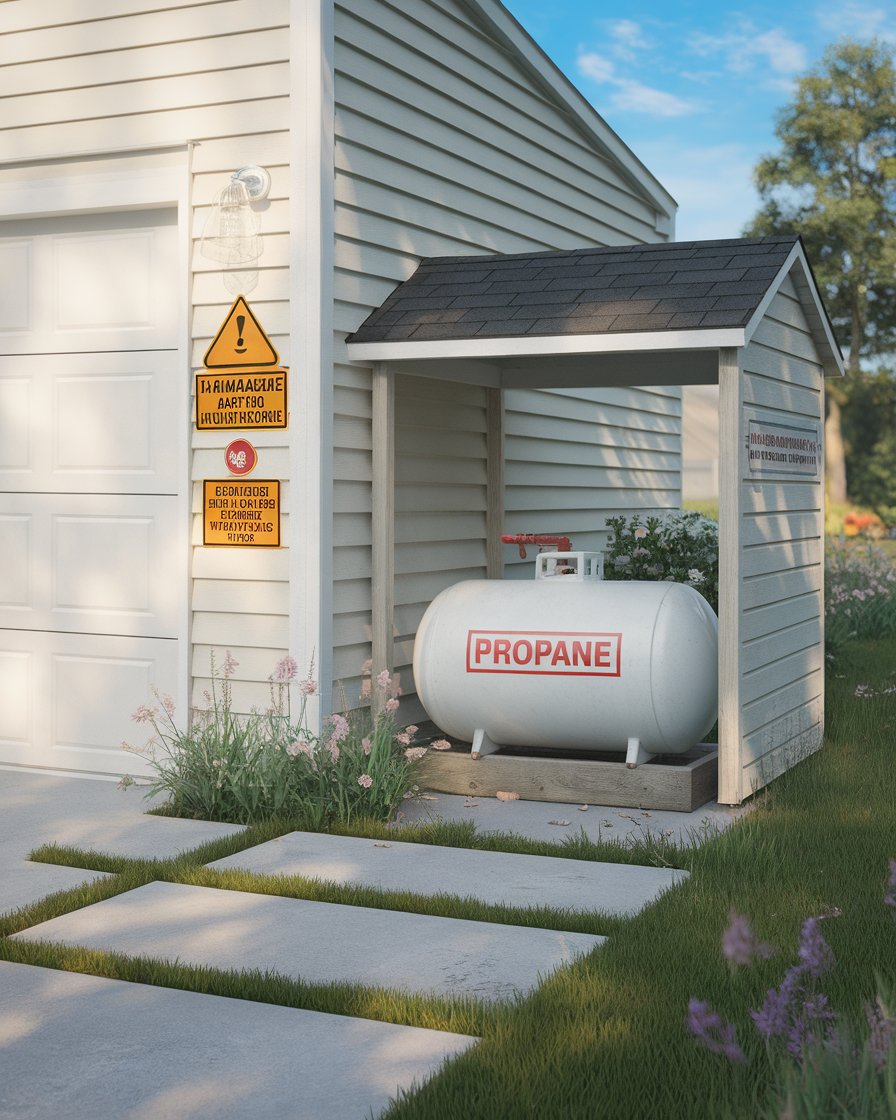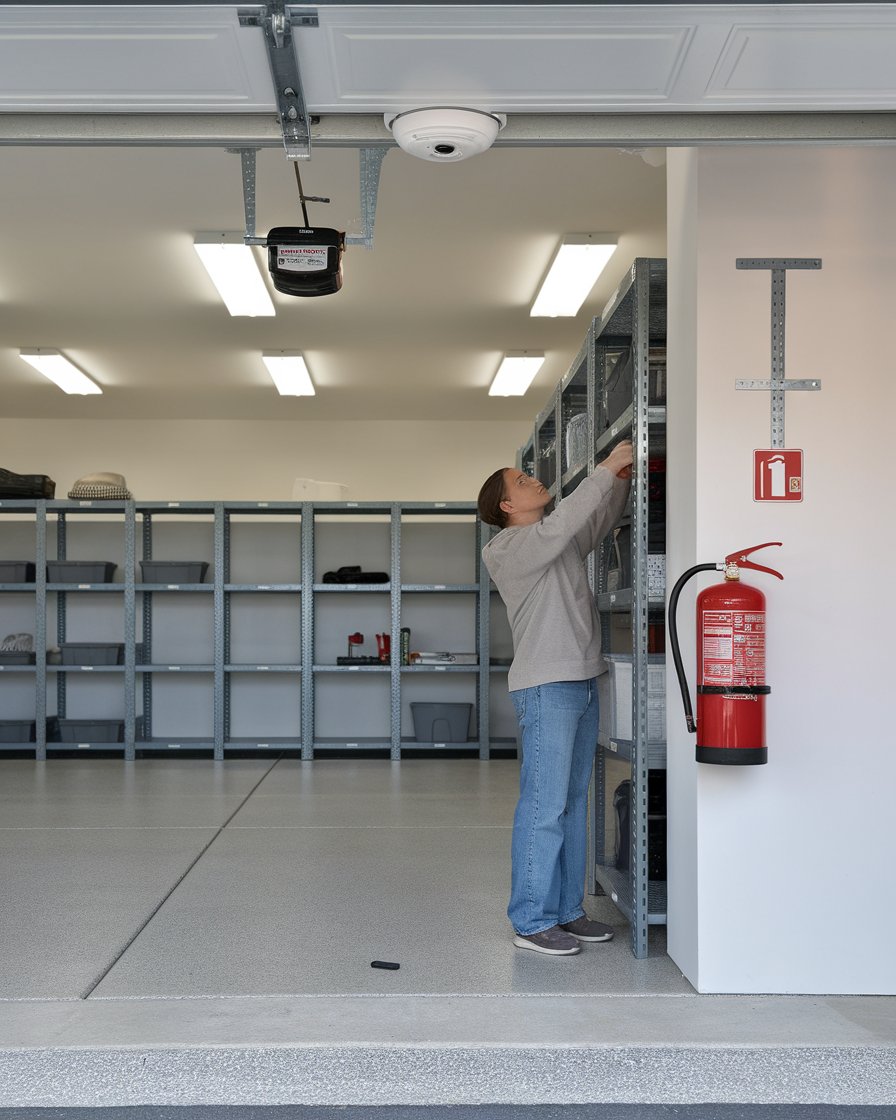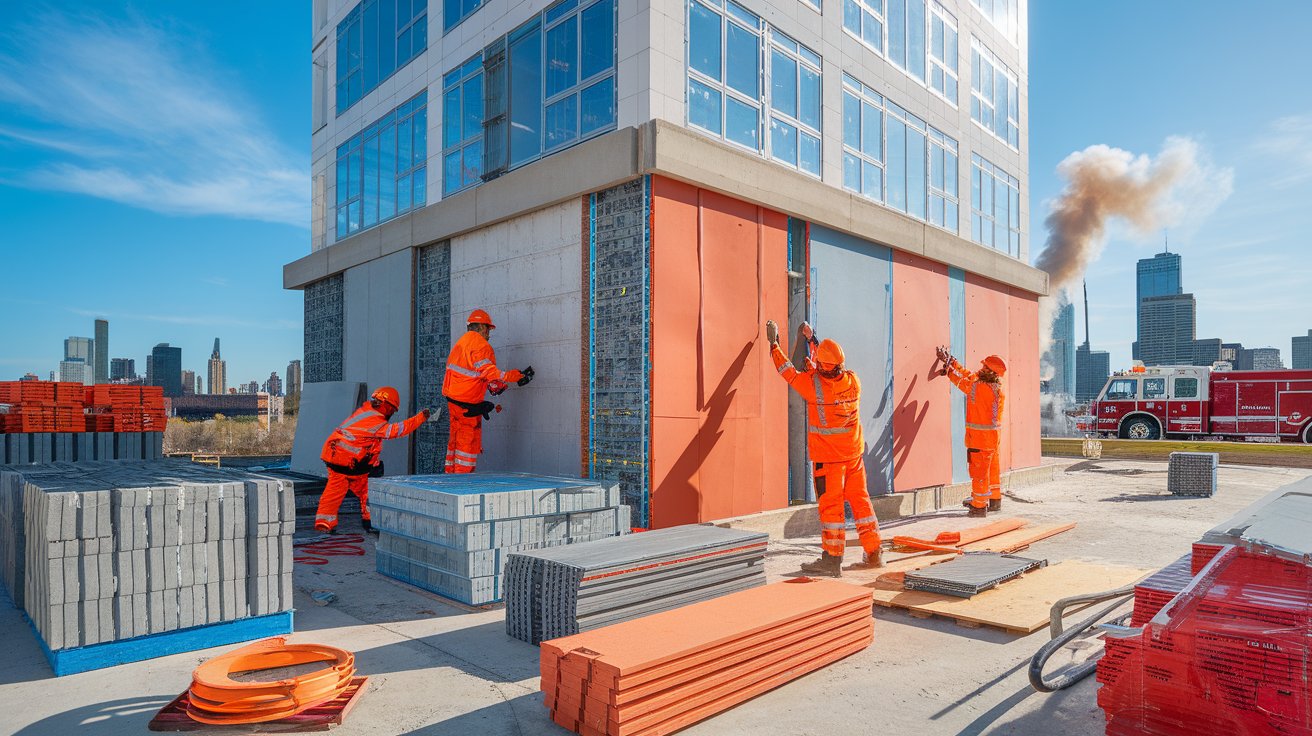Introduction
Garages are often the go-to spot for storing all sorts of things—flammable liquids, lawn care products, and even hazardous solvents. The problem is, when these items aren’t stored properly, they can become a serious fire hazard. For example, cleaning solvents and gasoline are often kept in the garage, but if they’re not in their original containers, they can cause fire risks that many homeowners don’t realize. A simple spark could ignite these hazardous substances, causing a fire that spreads quickly. That’s why it’s crucial to store these items safely and away from heat sources, like water heaters or exposed wiring.
Besides keeping hazardous solvents and flammable liquids in their original containers, proper garage storage is also about keeping things organized and clutter-free. A garage full of clutter can block pathways and increase the risk of accidents. Hazardous substances like oils, gasoline, and cleaning products should always be stored at ground level and in well-ventilated areas to prevent a buildup of dangerous fumes. By taking these precautions, you can seriously reduce the chance of a fire starting in your garage and keep your home safer overall.
Key Takeaways
- Improper storage of flammable liquids, such as gasoline and cleaning solvents, can increase fire risks in garages.
- Regularly inspecting electrical equipment and avoiding permanent use of extension cords can help prevent garage fires.
- Decluttering garages and properly storing hazardous materials reduces the chances of fire spreading quickly.
- Storing flammable liquids in sealed, labeled containers away from heat sources and ensuring proper ventilation is essential.
- Propane tanks should always be stored outdoors in a well-ventilated area to prevent potential fire hazards.
- Installing smoke alarms and keeping fire extinguishers accessible in garages are vital safety measures for early fire detection and prevention.
Common Fire Hazards Found in Garages
Garages often house a variety of flammable materials, making them a common area for fire hazards. Items like lawn care products, gasoline, and household chemicals are typically stored in the garage, many of which can pose significant risks if not stored properly. Combustible liquids, in particular, can cause fire risks if they come into contact with leaking electrical wiring or other heat sources. To ensure garage safety, it’s crucial to inspect for hazardous substances regularly and maintain good ventilation. By keeping your garage clean and clear of clutter, homeowners can reduce the likelihood of a fire spreading rapidly. Proper storage of these items in clearly labeled containers or storage cabinets can greatly minimize risks.
Key Safety Tips for Storing Flammable Materials in Garages
1. Proper Storage of Flammable Liquids
Flammable liquids like gasoline and solvents are commonly found in garages. These liquids should always be stored in tightly sealed, clearly labeled containers to avoid spills and reduce fire risks. Keeping them in their original containers can prevent dangerous fumes from leaking, while storage cabinets can offer additional protection from heat sources.
2. Regular Inspection of Electrical Systems
Electrical malfunctions are a leading cause of fires in garages. Extension cords should never be used permanently, and all wiring should be inspected regularly by a licensed electrician. Faulty wiring can easily ignite flammable materials, so it’s crucial to ensure your electrical systems are in good working order to avoid any spark that could lead to a blaze.
3. Decluttering to Prevent Fire Spread
A cluttered garage filled with flammable objects like cardboard boxes and old furniture can accelerate the spread of fire. Keeping your garage organized and storing hazardous materials in fireproof, clearly labeled containers or on elevated shelves can help minimize fire risks. Decluttering also ensures that pathways are clear, enabling quicker access to fire extinguishers in case of emergencies.
4. Ventilation to Reduce Fumes
Good ventilation is key in garages where flammable materials are stored. Many hazardous materials, such as gasoline, emit flammable fumes, which can accumulate in enclosed spaces. Installing a proper ventilation system helps disperse these fumes, reducing the risk of fire caused by surface contact with leaking substances.
5. Safe Handling of Propane Tanks
Propane tanks should always be stored outside the garage, away from direct sunlight or any heat sources. A small propane leak in an enclosed space can lead to a devastating fire. Regularly checking propane tanks for leaks and ensuring they are stored in well-ventilated areas can significantly reduce fire hazards.
6. Installing Fire Safety Equipment
Fire extinguishers and smoke alarms are vital tools for early fire detection and response. Make sure to have a multi-purpose fire extinguisher in the garage, and install interconnected smoke alarms that can alert you to a fire even if you’re in another part of the house. Regular maintenance of these devices can save your home from potential fire disasters.
Electrical Problems as a Leading Cause of Fires
Electrical issues are one of the primary safety hazards in garages, often caused by faulty wiring or the improper use of extension cords on a permanent basis. Many homeowners fail to regularly inspect the wiring in their garages, which can lead to serious accidents. Extension cords, when used permanently, can overheat and ignite flammable materials stored nearby. It’s vital to ensure that all electrical equipment is regularly inspected by a licensed electrician and that extension cords are not used as a permanent solution. This preventive measure can help avoid dangerous situations where a single spark could set off a blaze.
Clutter and Its Impact on Fire Spread
Clutter significantly increases the risk of fires in garages by providing additional fuel for flames to spread. Many garages are used as storage spaces for old furniture, cardboard boxes, and other flammable materials, making them a potential fire hazard. In case of ignition, clutter can cause the fire to spread quickly, turning a small incident into a dangerous blaze. To enhance garage safety, it’s essential to regularly declutter, storing items in fireproof, clearly labeled containers or on shelves. By minimizing flammable objects in the garage and maintaining proper ventilation, homeowners can reduce the chances of a fire spreading uncontrollably throughout this area of the home.
Storage and Handling of Flammable Liquids
Flammable liquids are frequently found in garages, ranging from gasoline to solvents and cleaning products. While these materials are essential for various tasks, improper storage can lead to severe safety hazards. Many of these liquids release flammable fumes, which, when exposed to a spark or high heat, can cause a fire to ignite rapidly. Storing such hazardous materials properly is key to preventing accidents. It is vital to keep flammable liquids in tightly sealed containers and away from sources of heat like water heaters or electrical malfunctions. Additionally, ensuring that these substances are clearly labeled and stored in well-ventilated areas minimizes the risk of ignition caused by surface contact.
Case Study: Improper Storage of Flammable Liquids Causes Garage Fire
In 2019, a homeowner in Texas experienced a devastating fire due to improperly stored flammable liquids in their garage. The garage contained several hazardous materials, including gasoline and cleaning solvents, which were stored in unsealed containers near a water heater. Over time, the flammable fumes from these liquids accumulated, and when the water heater ignited, it triggered a fire that spread rapidly throughout the garage.
Fire investigators later concluded that had the homeowner followed basic safety protocols—such as storing the flammable liquids in tightly sealed containers and placing them away from heat sources—the fire could have been prevented. Additionally, the garage lacked proper ventilation, which exacerbated the buildup of hazardous fumes. This case highlights the importance of following safe storage practices, ensuring flammable materials are kept in well-ventilated areas, and taking precautions to minimize risks.
Risks Associated with Flammable Liquids in Garages
Flammable liquids, such as gasoline and cleaning solvents, pose significant risks when stored in garages. The fumes emitted from these substances can accumulate in enclosed spaces, making even a minor spark a potential ignition source. Improper storage, such as leaving these liquids in unsealed containers or placing them near heaters or electrical outlets, increases the likelihood of accidents. For homeowners, understanding that these commonly stored items are hazardous is crucial. It’s essential to follow safety guidelines like keeping flammable liquids stored away from heat sources and ensuring good ventilation in the garage to reduce the chance of fire hazards.
Safe Storage Practices to Prevent Accidents
To safely handle flammable liquids, proper storage is key. Homeowners should always ensure these substances are stored in clearly labeled, tightly sealed containers to prevent spills or leaks. For additional safety, flammable liquids should never be stored indoors, especially near areas like the garage floor, where they can come into contact with electrical malfunctions or melted snow. A well-organized garage with hazardous materials kept in a designated, fireproof storage cabinet reduces the risk of ignition caused by flammable vapors. Homeowners should also consider installing ventilation systems to keep the air free of potentially hazardous fumes, ensuring a safer environment for the whole household.
Propane Tanks Safety Measures
Propane tanks are commonly used in homes for grilling, heating, and other purposes, but improper storage of these tanks can lead to serious safety hazards. Propane is a highly flammable gas, and even a small leak in an enclosed space like a garage can cause a fire if it comes into contact with an ignition source. Proper propane storage is critical to reducing these risks. Homeowners should always store propane tanks outside, away from direct sunlight and heat sources, in a well-ventilated area. This ensures that any leaking gas is dispersed safely and not trapped in an enclosed space, which can lead to dangerous outcomes.
Dangers of Improperly Stored Propane Tanks
Improper storage of propane tanks is a leading cause of fire incidents in residential areas. When tanks are kept in a garage or other enclosed spaces, the risk increases as leaking propane may accumulate. Even a minor spark from an electrical malfunction or surface contact with a leaking combustible material can lead to a massive fire. Homeowners should avoid storing propane tanks indoors, especially in attached garages where fumes can spread into the home. To prevent these hazards, it’s crucial to check propane tanks for any leaks and store them outside, away from heat and ignition sources, ensuring the safety of your household.
Disposal Guidelines for Propane Tanks and Flammable Liquids
Disposing of propane tanks and flammable liquids requires careful attention to safety protocols. Many areas, like Sacramento County, have specific guidelines for disposing of hazardous materials like used propane tanks. Homeowners should never dispose of propane tanks in regular trash bins, as this can pose a fire risk. Instead, contact local hazardous waste facilities for proper containment and disposal. Additionally, it’s important to dispose of flammable liquids, such as lighter fluid and cleaning solvents, in clearly labeled containers to avoid accidental ignition. Following these guidelines helps to keep both your home and the environment safe from potential fire hazards.
“Safety is not just a requirement, it’s a responsibility we owe to ourselves and those around us.” – Chris Loomis
Preventive Measures for Garage Fire Safety
Garages often contain a variety of fire hazards, making preventive measures crucial for ensuring safety. By proactively addressing potential risks, homeowners can reduce the chances of devastating fires. Proper storage of flammable chemicals and regular maintenance of electrical equipment are key practices to follow. It’s also important to keep the garage organized and free from clutter, especially flammable items like oily rags. Taking these precautions helps prevent small sparks from igniting hazardous substances, reducing the likelihood of a garage fire. Homeowners should stay informed about fire administration recommendations and follow guidelines to enhance safety in this commonly used space.
Importance of Fire Extinguishers in Garages
Having a fire extinguisher in the garage is one of the simplest yet most effective preventive measures homeowners can take. Fires can start quickly and unexpectedly, and having an extinguisher within reach can stop a small fire from becoming a full-blown emergency. A multi-purpose ABC fire extinguisher is ideal, as it can handle different types of fires, including those caused by flammable liquids and electrical issues. Regularly checking the extinguisher to ensure it is functional and keeping it in a visible, easy-to-access location are essential steps in preparing for emergencies. This small action can make a big difference when every second counts.
Installing Smoke Alarms for Early Fire Detection
Another essential safety feature for garages is the installation of smoke alarms. Early detection is critical in preventing fires from spreading, and smoke alarms provide a crucial warning system. Ideally, interconnected smoke alarms should be installed, linking the garage alarms to those in the rest of the home. This ensures that if a fire starts in the garage, the entire household is alerted. Since garage fires often result from unseen hazards like leaking combustible liquids or malfunctioning electrical components, smoke alarms offer early detection, giving homeowners the time needed to respond and potentially prevent a larger disaster.
Conclusion
Keeping your garage safe means paying close attention to how you store flammable materials. Hazardous solvents typically stored in garages, like gasoline and cleaning products, should always be kept in their original containers. Why? Because improper storage of these liquids can cause serious fire risks. Placing them near heat sources, such as water heaters or faulty wiring, can turn a small mistake into a big problem. Taking these safety steps helps reduce the dangers and ensures your garage remains a safe space.
On top of that, regular decluttering and good ventilation are must-haves. Garages are often packed with items that can catch fire easily. Things like propane tanks, for instance, should always be kept outside. If they leak, it can lead to fire risks that are hard to manage indoors. Installing smoke alarms and having fire extinguishers on hand can save your home from disaster. These small changes can make a big difference in reducing the cause of garage fires and keeping your family safe.


